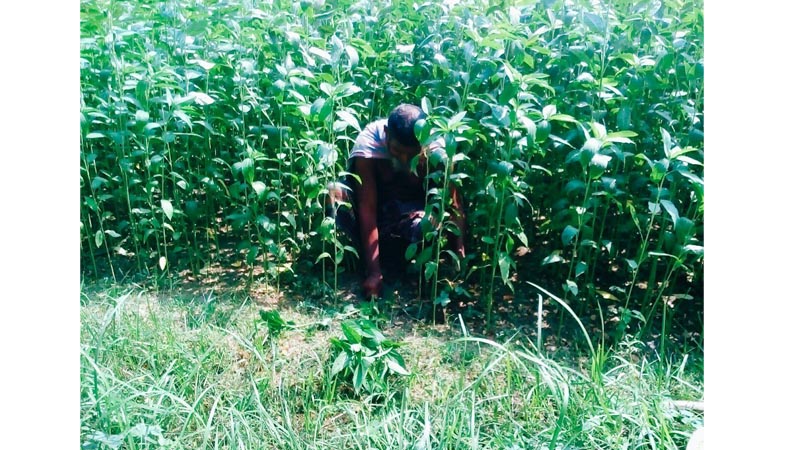Initiative should be taken to increase jute farming area in Jashore region

The farmers in six districts of Jashore region are reducing the jute farming area this season. Least price in the market and huge expenditure in jute production are main reason behind reduction of land. Price of jute seeds was also fallen in the market compared to past seasons, said the farmers.
For want of dependable seeds in the wider market, some of the Indian seeds ensure better germination with better production compared than the local ones.
Sabder Hossain, a farmer of Aguniapara village in Sailkupa upazila of Jhenidah, said he had had cultivated jute on his one bigha of land to meet his family requirements. He brought two and a half bigha under the farming last season.
The farmer has been reducing the jute farming area every year as there is no demand of the fibre in the market. About five years back, he had cultivated jute on five bighas.
Farmer Bipul Biswas of Kalicharanpur area in Jhenidah Sdar upazila said, they are facing troubles with the increasing farm labourer charges every year. Daily charge of a laborer rises to Taka 600 to 650 as against taka 400 to 450 during the jute weeding and harvesting hours. Further, they can not receive optimum prices of the “once golden fibre” in the market.
The farmer said they are selling each maund (40 kilograms) of jute fibre at Taka 1,250 to 1,300 in the early season. The price increases slightly when the stock of the farmers is ended. The middlemen, not the farmers are benefited then. Following the price fall, the farmers like him reduced cultivate jute this season, he said.
According to the farmers, it needs at least taka 1,500 to produce the same for land leasing, seeds, fertilizer, pesticides, irrigation water supply, cleaning, drying up and transport costs. But they can not receive even the production cost from the sale proceeds of the jute.
A renowned seed vendor of Bangladesh Chemical Industries Corporation (BADC) in Sailkupa upazila of Jhenidah Mia Rasheedul Hasan said, a seed dealer the farmers started sowing of the jute seeds since first day of Bengali month Chaitra (mid March), when the demand of the jute seeds was least in the season. Seed supply from the BADC and some private companies of neighboring India are almost available in the market.
A sachet of two kilogram jute seeds produced in INdia by Krishisebayan, Chakra, NSC, Bankim, Betabeti and some other varieties had a good demand to the farmers. But there was no major demand in the current season like past ones, Each two kilogram sachet of the jute seeds was being sold at Taka 24o to 250, while it was at least 500 Taka two years back.
Deputy assistant director of Bangladesh Agriculture development corporation (BADC) Seeds Safiuddin Sabuj when contacted said they had distributed about nine tons of local seeds among the farmers free of cost through the jute department this season. But the Indian variety ensures better germination and yield that attracts the farmers for their interest, deputy assistant director added.
Deputy Director of the DAE in Jhenaidah GM Abdur Rauf when contacted said the farmers always consider their financial matter during the farming. If they are not benefited from the jute, it will discourage them from farming the same in near future.
According to a source related to the department of agriculture extension in Jashore, the government has set a target to produce 1909,658 bales of jute on 161,425 hectares of land in six districts under Jashore region.
Till May 29 the farmers brought 20,140 hectares out of target for 26,450 hectares in Jashore, 20,225 hectares out of 22,825 hectares in Jhenidah, 32,550 hectares out of 36,110 hectares in Magura, 36,921 hectares out of 35,480 hectares in Kushtia, 5,225 hectares out of 15,180 hectares in Chuadanga and 19,920 hectares out of 25,310 hectares in Meherpur district this season.
In the past season the farmers of six Jashore region brought123,089 hectares of land and produced 292,059 tones of jute, the deputy director of the Jashore region deputy director of the DAE Sukhendu Kumar Malaker said.
Read Bangladesh Post National categorie news.




